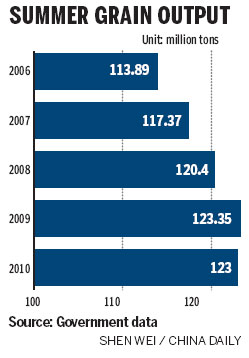Price swings in agricultural products to be monitored
The government will keep a close watch and take steps to prevent further fluctuations in the prices of goods like garlic and mung beans, a top official with the National Development and Reform Commission (NDRC) said on Thursday.
Prices of products like garlic and mung beans hit the roof in the first few months of the year as bad weather crimped supplies and led to rampant speculation. Subsequently the government intervened and prices have now more or less returned to normal levels.
Though the new moves will help check speculation and hoarding, inflationary pressures will still persist, economists said.
"The government intends to keep tabs on the prices, trading volumes and inventories of the goods that have an impact on day-to-day life," said Xu Kunlin, director-general of the pricing supervision department of the NDRC.
The government will come out with rules to punish violators and also incorporate suitable warning mechanisms, he said, without indicating any time frame for the measures.
At the same time there will also be steps to regulate the e-commerce market, considered a major platform for speculative trading, Xu said.
In fact, the government has already made a start in this direction and controlled the prices of garlic and mung beans by imposing fines of up to 1 million yuan on the violators.

The average prices of mung beans and garlic were around 13.5 yuan and 8.2 yuan per kilogram in late June, down 30 and 12 percent respectively over the prices early this year.
"By signaling its intention to keep prices under control, the government has shown that it intends to address the speculation issue seriously," Xu said.
He, however, declined to comment on whether the government will be able to achieve the 3 percent consumer price index target.
The government's confidence that it will keep the prices of these goods under control also stems from the good harvest of summer grains.
China's summer grain output this year stood at 123 million tons, close to last year's level of 123.3 million tons.
Though the overall output decreased slightly, the yield of winter wheat, which matures in the summer, increased by about 1 million tons to 108.5 million tons, compared to last year.
Ding Shengjun, a researcher at the Academy of State Administration of Grain, expressed confidence that the good summer crop and timely government measures would keep prices under control and reduce inflationary pressures.
He said sowing operations during the fall season would be on track, but the final crop would still be largely dependant on the weather conditions during the growing period.
Keeping prices of agricultural products stable is a major task for managing this year's inflation expectations, said Li Guoxiang, a researcher with the Rural Development Institute of the Chinese Academy of Social Sciences.
He said prices of agricultural products have soared this year and there is a possibility that the trend will continue.
Rising grain and meat prices may see the CPI surge in the fourth quarter or the spring of 2011, Li said.
With fertilizer and labor costs going up, an increase in agricultural product prices is essential to stimulate the initiative of farmers and ensure long-term food security, said Li.
 0
0 







Go to Forum >>0 Comments